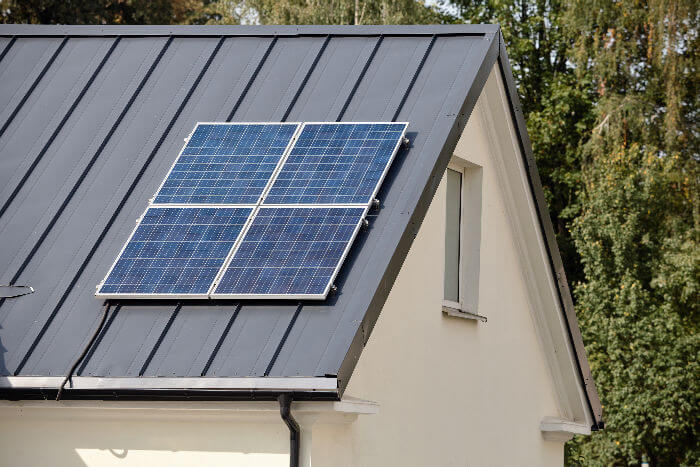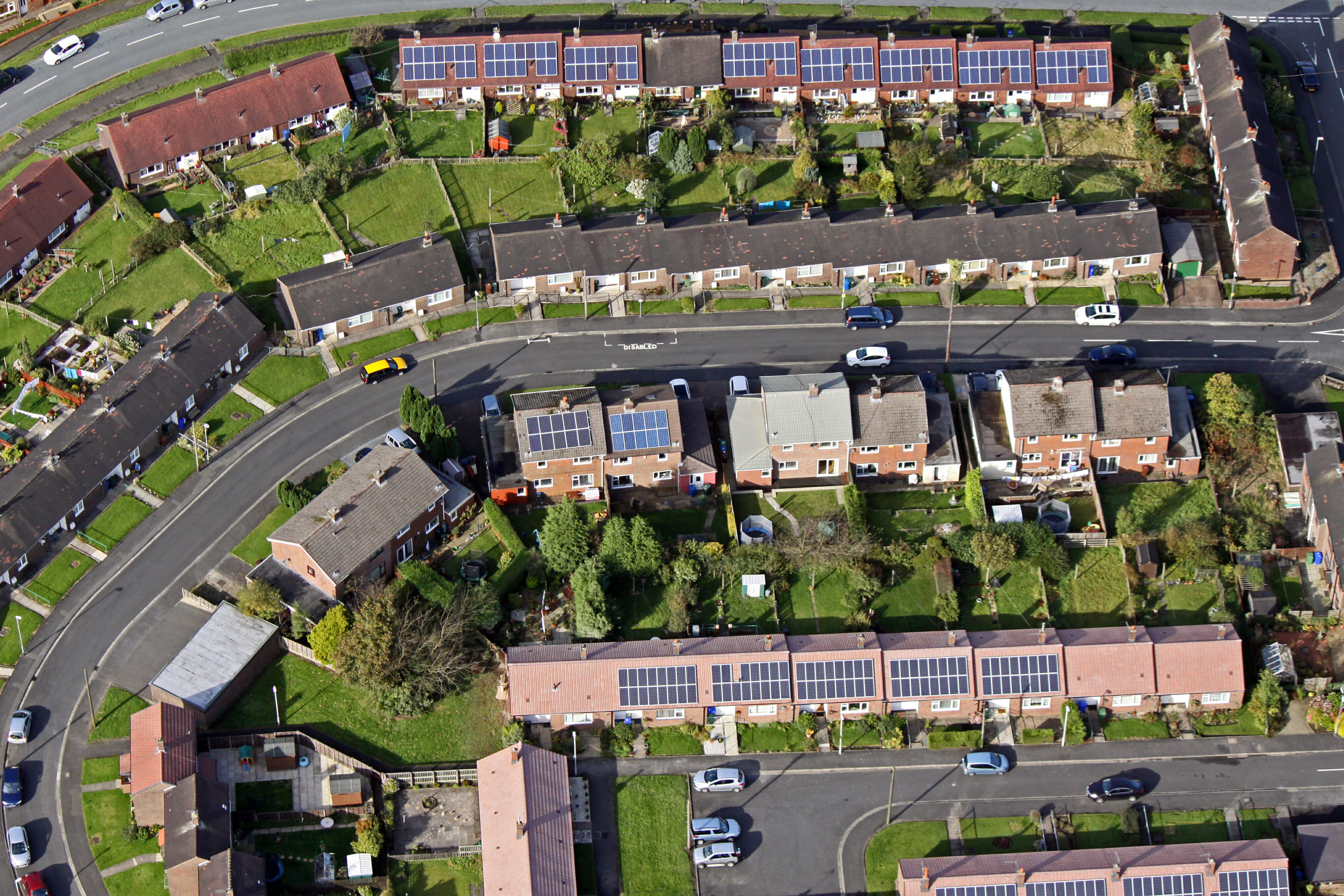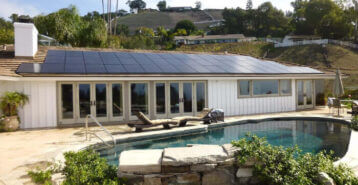Are you doing a solar project?
Modernize can pair you with three to four pros in your area, so you can compare options and save time and money.
- Are Solar Panels Worth The Investment?
- Do Solar Panels Increase Home Value?
- Do You Live in an Active Solar Market?
- Owning Your Solar Panels
- Solar Leases Make Resale Difficult
- Finding the Right Buyer
- Solar Listings Also Spend Less Time on the Market
- Some Factors That Can Affect Property Values for Solar Homes
- Avoiding Increased Property Taxes
Whether you’re looking to make your home more eco-friendly or simply interested in reducing your power bill, you’ve likely considered solar panels. But there’s so much to factor in when taking on this investment, including whether or not solar panels will increase your home’s value. So, what are the long-term benefits and the up front costs of such a project?
In short, solar energy can improve your home’s resale value. We’ll take a look at each consideration.

Are Solar Panels Worth The Investment?
Look at the cost of your energy consumption—your energy bill. Did it make you sweat a little? Installing solar panels is a great long-term option for lowering your energy bill and reducing the strain on your city’s electric grid—preventing rolling blackouts during seasons of high energy usage.
Purchasing solar panels for your home is a major investment, but one that will pay you back over time, saving you money in the long run. Not only will solar panels cut back on your monthly utility bills, they’ll also return the favor when it comes time to sell your property.
Do Solar Panels Increase Home Value?
Multiple studies show that solar increases home sale prices. In most cases, the value went up by several thousand dollars.
Find the Right Contractor for Your Solar Project
Whether you’re ready to begin your project now or need some expert advice, our network of contractors are here to help. With a few simple questions, we’ll find the best local professionals for you
According to research from the Appraisal Journal, cited by National Renewable Energy Laboratory, solar panels add about $20 in home value for every $1 they saved in annual utility bills. That means if you save $300 on your energy bill each year, you’ll add about $6,000 to the value of your home.
Buyers have also said they’d be willing to pay up to 10 percent more for a home already equipped with solar panels.
In addition, research coming out of the Lawrence Berkeley Laboratory showed home buyers are consistently more willing to purchase homes with solar systems. Their study looked at the sale of 22,000 homes across eight states, about 4,000 of which had systems installed. The result was that systems added a premium of about $15,000 for a typical PV system, about $4 per watt installed.
Do You Live in an Active Solar Market?
An active solar market is an area of the country that receives ample sunlight and is home to residents already utilizing solar power in their homes. The most active solar markets are: California, Arizona, North Carolina, New Jersey, Nevada, Massachusetts, New York, Hawaii, Colorado, and Texas. Homeowners with solar panels in those areas are more likely to sell their homes for a higher price than homeowners without solar panels.
If you don’t live in one of the most active solar markets, don’t worry. With solar technology improving daily, more and more homes all over the country are having solar panels installed. There are solar panels that operate fairly efficiently during cloudy weather and still lower your energy bill. For this reason, solar panels are attractive home additions to potential buyers all over the country.
Choosing to own the solar panels you install on your home, versus leasing them, is the best option for increasing the value of your home. While the upfront cost of installing solar panels can be daunting, keep in mind that you can take advantage of federal and local rebates in your area, which will ease the initial cost over time. When you own your solar panels, their value is added to your home during the price assessment and will most likely increase the selling price of your home. If you’re leasing the solar panels, they will still add value to the new homeowner, but it will not be included in the selling price of your home. If you do opt to lease the solar panels and decide to sell your home, you could show any potential buyers the amount of money saved by using solar, and possibly negotiate to add the leased solar panels to the cost of your home The benefits of solar on your home value apply mainly to households that have purchased their equipment. If you have a lease, your solar equipment could potentially become a major impediment to selling. Anecdotal evidence from Realtors suggests homeowners with solar leases like those offered by SolarCity have a hard time closing the deal when it comes time to sell. Turning over a solar lease can be a complicated process. Generally, your buyers will have to fill out a separate application—and qualify for credit—to take over your lease. That might not be all that enticing to buyers, so they may ask you to buy out your leasing contract as a stipulation in their offer, meaning an extra $15,000 to $20,000 expense. Taking over a lease can feel like uncharted territory. Occasionally, the legal details will be downright murky. Realtors all say that they’ve seen buyers back out on offers once solar leases came into the discussion. So unless you plan on sticking around for a while—or don’t mind the extra work of negotiating a lease takeover—it’s better to buy your panels outright if you intend to sell your home at some point. With interest in solar only set to grow, solar panels make a truly smart investment—not only while you stay in your home, but when you go to sell, too. Green is in right now—and we don’t just mean when it comes to your closet. Consumer surveys show that buyers are highly influenced by terms like “energy-efficient” and a hefty 61% of those asked said solar energy systems were either desirable or essential when they looked at homes. Millennials in particular seem drawn to green features. They like smaller, efficient homes with energy-friendly features like better HVAC systems. Solar energy systems definitely fit that bill. In fact, according to a number of studies, solar increasingly adds to the sale price of homes that have it—and turns them around faster on the market, too. Trying to move your home fast? If your house has solar installed, don’t expect it to last long on the market. When the National Renewable Energy Laboratory ran its own case study of San Diego homes, it found that houses with solar panels sold 20% faster than comparable non-solar properties. Local realty companies in Arizona noticed a similar trend. When they analyzed sales trends back in 2014, their data showed that solar moved houses faster. Of course, these studies are both coming out of regions that are pretty amenable to solar—California and Arizona were the number one and two states in the country for capacity in 2016. There’s no thorough data yet to examine how solar affects sale times across the country, but as a highly-desired feature nationwide, you’d expect solar homes to turn over fast, no matter where you are. Different markets may be more or less favorable to solar homes, of course. One thing that vastly influences its popularity are regional variations in the price of electricity. The effect is just what you’d expect: areas with high utility bills tend to draw more beneficial sale prices for solar homes. Additionally, the political attitudes of a region can affect solar premiums as well. For instance, homes in locations that swing toward the left—especially on environmental issues—get higher marks for sale prices on solar homes. The number and quality of solar panels on the property should be proportional to the size of your home in order for them to improve your home’s value. For example, a 4,000 square foot home should have more solar panels than a 1,000 square foot home. This is because it takes more electricity to power 4,000 square feet than it does 1,000 square feet. Moreover, generally larger homes have higher values when re-selling. Adding solar panels will simply maximize your home’s value, whatever its size. While solar panels add value to your property, they won’t necessarily drive up your property taxes. As an incentive to install solar, many local governments exempt solar homeowners from paying any additional property taxes associated with their array. However, that amount is still added to your valuation, so you get all the benefit of increased property values without paying the price. If you’re looking to install solar to add to your property value, it’s not a bad idea to investigate how your local tax assessor handles solar arrays. So, do solar panels increase home value? No matter which metric you use to measure that value, the answer is yes.
Owned Solar Panels
Leased Solar Panels
Owning Your Solar Panels
Solar Leases Make Resale Difficult
Finding the Right Buyer
Solar Listings Also Spend Less Time on the Market
Some Factors That Can Affect Property Values for Solar Homes
Avoiding Increased Property Taxes
Find the Right Contractor for Your Solar Project
Whether you’re ready to begin your project now or need some expert advice, our network of contractors are here to help. With a few simple questions, we’ll find the best local professionals for you
Reviews from Real Homeowners
Welcome to Homeowner Resources! We are the Modernize blog. Modernize pairs more than 3 million homeowners a year with pre-vetted contractors in their area. This blog started because we believe homeowners should know everything about their homes, from how their HVAC works to which front door colors they might love. On Homeowner Resources, you can find information on every part of your home, right down to how you can negotiate with contractors to get the best price. Here's more about the blog.
Need a contractor? Learn more about how Modernize finds the right pro for you.



